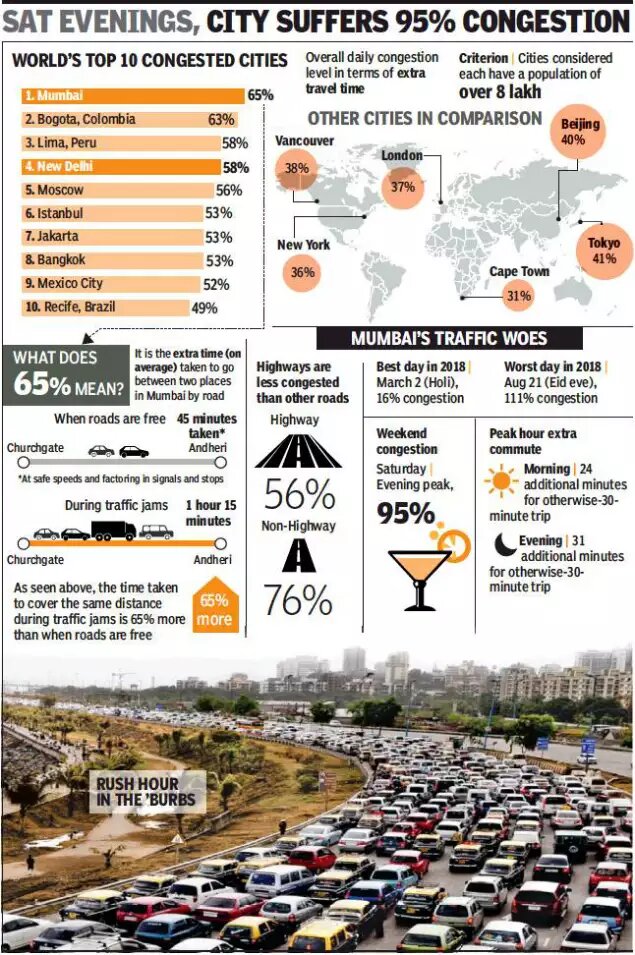Indian Economy
Traffic Index 2018
- 10 Jun 2019
- 4 min read
As per the GPS-based study on traffic congestion, Mumbai has been ranked as the most traffic-congested city in the world for the second consecutive year.
- Traffic Index 2018 is published by TomTom, an Amsterdam based company that offers traffic solutions, by using location technology to collect traffic information.
- The latest index ranks 403 cities across 56 countries, including 13 new cities.

- Bogota in Colombia and Lima in Peru were ranked second and third on the list respectively, while the Russian capital Moscow ranked fifth.
- Delhi is the fourth most traffic congested city in the world.
- Congestion has been defined in terms of the additional time taken to reach a destination as opposed to when the road would have been clear of traffic.
- Mumbai’s extra travel time is 65% more than an average trip would take during uncongested conditions and Delhi’s extra travel time is 58% more.
- As per the study, nearly 75% of the cities part of the 2018 index had increased or stable congestion levels between 2017 and 2018, with only 90 cities showing measurable decreases.
Effects of Traffic Congestion
- Environmental concerns like Increasing air and noise pollution.
- In 2016, a World Health Organisation (WHO) study found that fourteen of the twenty world’s most polluted cities belonged to India.
- Road accidents: India experiences 120,000 deaths per year due to traffic fatalities, more than any other country.
- Delhi has the highest accident rate in India and third-highest in the world.
- Economic loss is concerned with the monetary value of the time spent sitting in traffic.
- Congestion in Delhi, Mumbai, Bangalore, and Kolkata costs the economy Rs 1.47 lakh crore annually, according to a study conducted by a global consultancy firm.
- Traffic congestion in Bangalore alone costs the city approximately 5% of its economic output.
- Blocked traffic also interferes with the passage of emergency vehicles etc.
- Traffic rules, red lights, lane driving are not followed which are both the causes and effects of traffic congestion.
- On a positive side, traffic congestion indicates a strong global economy.
Way Forward
- Road expansions and overpass construction projects must be taken up by the government.
- Improvement in public transport and additional schemes like the Bus Rapid Transport (BRT). The BRT is implemented in some cities like Pune, and it can be very helpful if implemented correctly.
- Proper road network planning and Traffic engineering and management.
- Strict and stringent measures(through fines and penalties) against traffic violators
- Provision of commuter subsidies for public transport, carpooling or Ridesharing.
- In Delhi alone, 22,369 acres can be freed up by ridesharing.
- There is a need for a shift from car-centric policy to a restriction imposed over the purchase of cars or four wheelers.
- Preferred parking locations for employees who choose to carpool.
- A free shuttle service from nearby metro stations to all corporate offices can address the issue of last mile connectivity.
- A commuter guidebook for all employees containing comprehensive information about alternative transport options.




